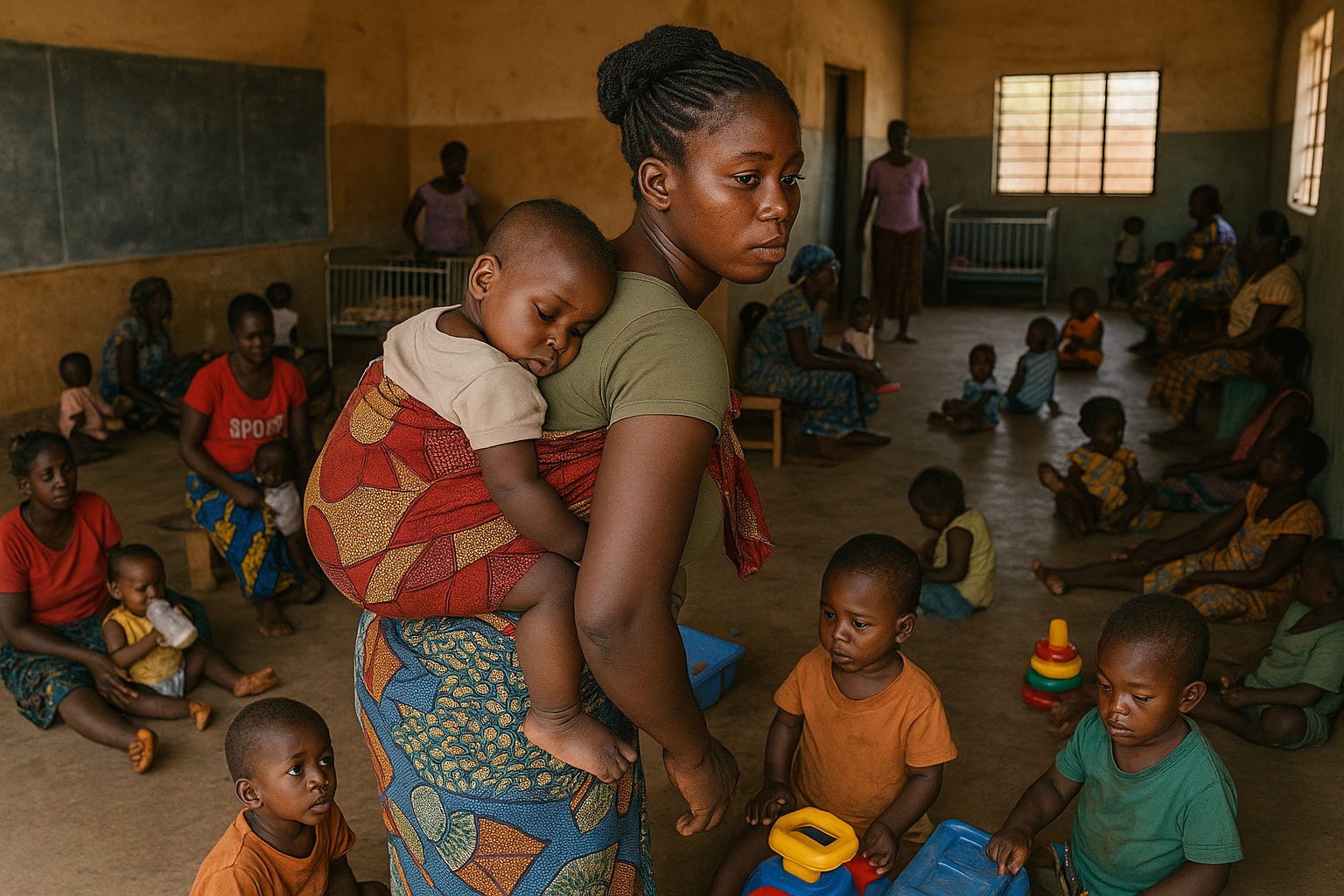A new ethnographic study from the World Bank’s Africa Gender Innovation Lab, in collaboration with the University of Bordeaux’s Bordeaux Population Health and the Université de Genève, unveils the fragile balance between motherhood and survival among low-income families in Ouagadougou, Burkina Faso. Titled Double Burden, Unequal Ground, the research exposes the acute strain placed on women who must work daily to sustain their families while simultaneously serving as their children’s primary caregivers. In a region where formal employment is rare and maternal leave is practically non-existent, these women navigate unsafe streets, hazardous job sites, and unrelenting emotional pressure, without access to reliable childcare. Gender norms still firmly place the caregiving responsibility on women, and with extended family networks weakening and paid childcare far too expensive, mothers are left with few options that safeguard either their children’s well-being or their own.
Childcare Deserts in Informal Neighborhoods
The study’s findings emerge from twelve months of immersive fieldwork, including sixteen case studies and over fifty interviews across four districts of Ouagadougou. The neighborhoods, largely informal settlements, suffer from a lack of basic infrastructure, no piped water, poor roads, and insecure housing. The research paints a stark picture: despite almost all women working to support their households, few can afford to place their children in crèches (a place where small children are looked after while their parents are working, shopping, etc). Most private childcare centers charge fees that are double or even quadruple those of the government-supported Labor-Intensive Public Works (LIPW) crèches. These subsidized centers, introduced as part of a public employment initiative, became a lifeline for families during and after the program, with fees ranging from just $2.50 to $9.50 per month. For many, these crèches represented the only viable way to ensure their children were safe while they worked.
Mothers at Work, and in Constant Worry
Mothers who lacked access to crèches described bringing their children with them to dangerous job sites. From roadside food stalls to waste dumps, these work environments posed serious threats. Several mothers told of children who nearly drowned in flooded drains, wandered off into traffic, or were nearly burned by hot cooking oil. Others worked from home, only to find their living spaces equally unsafe and mentally taxing. With cramped housing and unsecured courtyards, children frequently slipped out unnoticed. One mother recounted the horror of finding her young daughter three kilometers away after she had wandered off. These incidents underscore the impossibility of focusing on work while constantly worrying about a child’s safety.
Even when fathers were present, caregiving remained firmly the mother’s domain. Men occasionally helped, but typically only when they had no competing obligations. Cultural expectations, the study shows, prevent women from being relieved of childcare duties, regardless of how central their income is to family survival. One woman shared that her husband wouldn’t allow her to take a cleaning job that required her to leave early, as it would shift the morning caregiving onto him, something he resisted. These deep-seated gender dynamics leave women with no choice but to organize work around childcare, while the reverse rarely holds.
Crèches as Gateways to Opportunity and Wellbeing
Where LIPW crèches were available, mothers reported a sense of relief that went beyond convenience. Many said they were able to switch to better-paying or more stable jobs. A cleaner, for instance, explained how the crèche enabled her to take on extra clients and increase her income. Another mother described how her child’s exposure to songs, letters, and play at the crèche helped her develop socially and intellectually in ways that would not have been possible if she had remained tied to her back at market stalls. Fathers, too, acknowledged the benefits, with one calling the crèche “a place for children to grow in health and knowledge.”
Importantly, the crèche offered more than early learning; it offered physical safety. Parents expressed gratitude that their children were not exposed to fires, toxins, or road traffic while they worked. Some mothers, like a vendor named Pia, spoke about the emotional strain of carrying children for 10 hours a day in the scorching sun. After enrolling her child in the crèche, her physical pain eased, and she no longer had to soothe her overheated toddler under extreme conditions. These benefits, though hard to quantify, powerfully illustrate how childcare services protect both mother and child from harm.
Rethinking What Childcare Really Delivers
The researchers argue that the traditional metrics used to evaluate early childhood programs, such as school readiness or women’s workforce participation, miss much of the story. They call for a broader, more humane framework that values freedom from injury, reduced stress, physical relief, and emotional peace of mind. One mother poignantly captured this when she said, “My heart does not get dirty, because I know where my child is.” For families teetering on the edge of poverty, knowing their child is safe while they earn a living can be the difference between resilience and collapse.
The absence of accessible group-based childcare, the study finds, deepens inequality and reinforces cycles of poverty. It limits women’s ability to earn, saps their physical and mental health, and jeopardizes child development. For these families, investing in childcare is not merely an economic opportunity, it's a social and moral necessity. The voices from Ouagadougou make it resoundingly clear: until care work is valued and supported, low-income mothers will continue to bear the unbearable, balancing the weight of motherhood and survival on a tightrope with no net.











